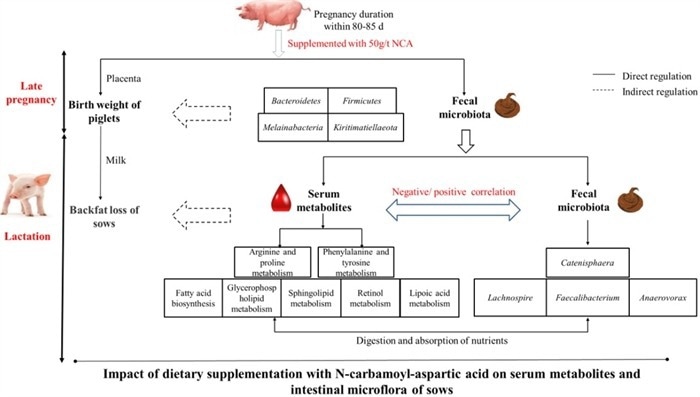The primary fetal organ systems’ growth and development are strongly influenced by the mother's nutrition status. Late gestation is when fetal growth is rapidly accelerated, and the nutritional needs of sows rise dramatically due to the fetus’ rapid growth and the placenta’s quick expansion.
 Impact of Dietary Supplementation with N-carbamoyl-aspartic Acid on Serum Metabolites and Intestinal Microflora of Sows. Image Credit: Lumin Gao
Impact of Dietary Supplementation with N-carbamoyl-aspartic Acid on Serum Metabolites and Intestinal Microflora of Sows. Image Credit: Lumin Gao
The health and development of the fetus depend greatly on glucose, fatty acids, and amino acids, the most crucial components of maternal nutrition.
Additionally, the small intestine of the fetus proliferates in the late stages of pregnancy, and a damaged intestine in the fetus can cause increased rates of diarrhea and slower postnatal development. Sow nutrition during late gestation and lactation must be controlled to promote piglet health and increase productivity in the pig industry.
The Chinese Academy of Sciences’ Institute of Subtropical Agriculture study team led by Xin Wu has thoroughly examined the effects of providing dietary nucleotides on sows and covered topics such as intestine development, nutritional metabolism, and placental transport.
The scientists discovered that maternal supplementation with nucleotides, pyrimidine nucleosides, and uridine might control placental nutrition transport, mostly in response to a change in mTORC1-PPAR signaling.
Supplementing with maternal nucleotides, pyrimidine nucleosides, or uridine also modulates the metabolism of newborn piglets’ nucleotides, glucose, amino acids, and fatty acids, somewhat enhancing the sow’s ability to reproduce.
Furthermore, maternal nucleotide and uridine supplementation lowered the frequency of diarrhea by controlling cytokine production and the function of the intestinal mucosal barrier in neonatal and suckling piglets, which increased the weaning weight of the litter of suckling piglets.
N-Carbamoyl-aspartic acid supplementation also controlled the intestinal microbial composition of sows and the differential metabolites related to the metabolism of arginine, proline, phenylalanine, tyrosine, and fatty acids in serum, which could have influenced the sows’ loss of backfat in addition to the birth weight and diarrhea rate of the piglets.
These results give the judicious use of nucleotides in sow breeding a theoretical foundation and technical backing.
Source:
Journal references:
- Gao, L., et al. (2022). Yeast-based nucleotide supplementation in mother sows modifies the intestinal barrier function and immune response of neonatal pigs. Animal Nutrition. doi.org/10.1016/j.aninu.2020.06.009
- Gao, L., et al. (2022). Maternal pyrimidine nucleoside supplementation regulates fatty acid, amino acid and glucose metabolism of neonatal piglets. Animal Nutrition. doi.org/10.1016/j.aninu.2022.07.011
- Gao, L., et al. (2022). Impact of dietary supplementation with N-carbamoyl-aspartic acid on serum metabolites and intestinal microflora of sows. Journal of the Science of Food and Agriculture. doi.org/10.1002/jsfa.12186
- Gao, L., et al. (2022). Maternal yeast-based nucleotide supplementation decreased stillbirth by regulating nutrient metabolism. Journal of the Science of Food and Agriculture. doi.org/10.1002/jsfa.11037
- Gao, L., et al. (2022). Maternal dietary uridine supplementation reduces diarrhea incidence in piglets by regulating the intestinal mucosal barrier and cytokine profiles. Journal of the Science of Food and Agriculture. doi.org/10.1002/jsfa.12186
- Gao, L., et al. (2022). Maternal supplementation with uridine influences fatty acid and amino acid constituents of offspring in a sow–piglet model. British Journal of Nutrition. doi.org/10.1017/S0007114520003165